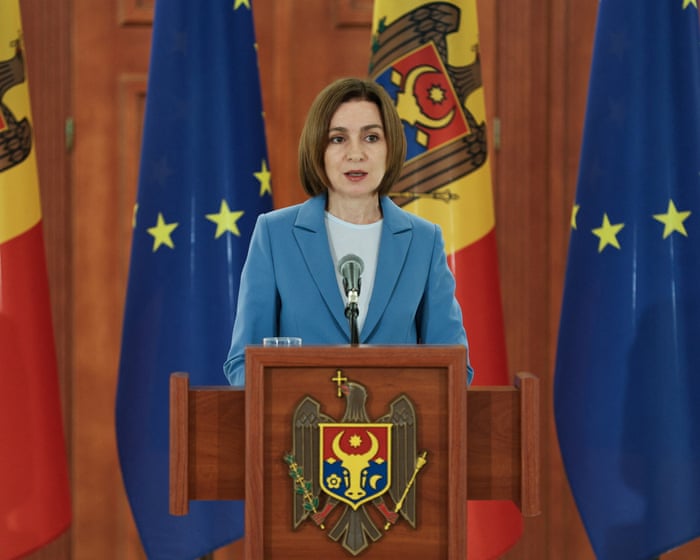In the end, the outcome exceeded the expectations of Moldova’s Western allies. In Sunday’s parliamentary elections, President Maia Sandu’s pro-EU party secured a decisive victory, reinforcing this former Soviet republic’s alignment with the West.
With almost all votes tallied, Sandu’s ruling Action and Solidarity party won 50.03% of the vote, while the pro-Russian Patriotic bloc received 24.26%. This strong performance came despite widespread accounts of Russian interference and significant challenges that could have destabilized any government.
Since the last parliamentary elections in 2021, Russia’s full-scale invasion of neighboring Ukraine has brought 135,000 refugees to Moldova—the highest per capita number of Ukrainian refugees globally—and triggered an energy price surge that drove inflation to a peak of 34%. Despite these pressures, the PAS saw its vote share decline by less than 3% compared to 2021.
For Sandu, a former World Bank official re-elected as Moldova’s president in 2024, this is a resounding win. She aims for Moldova to join the EU by 2030. With a secure parliamentary majority, rather than the fragmented coalition many predicted, it should be easier to implement the necessary political and economic reforms for EU membership.
The result is also significant for the EU, which has invested political capital in Moldova. The European Commission has committed €1.9 billion in grants and low-interest loans to fund infrastructure projects like roads, hospitals, and internet cables, boosting the economy and accelerating integration into the European single market. Last month, the leaders of Germany, France, and Poland made a high-profile joint visit to Moldova on its independence anniversary to show solidarity.
However, relief is tempered by the recognition that this is just one step in a longer journey. “The fight is not over,” Moldova’s former Prime Minister Natalia Gavrilița said at a security conference in Warsaw on Monday. She emphasized their determination to carry out reforms despite challenges and capacity constraints.
Clara Volintiru, head of the German Marshall Fund’s Bucharest office, noted that electoral mobilization for the pro-Moscow bloc was not massive. But she cautioned that this doesn’t mean Russia’s “tactics of manipulation and interference” have failed, as Russian efforts target the entire electoral process, not just the vote itself.
“The goal of Russian interference is to amplify societal distrust and undermine public confidence in the government, the president, and Moldova’s European future,” she explained.
Before the election, Moldovan authorities accused Russia of spending hundreds of millions of euros to influence the outcome. Dozens of men were arrested for allegedly traveling to Serbia to train in breaching police lines and resisting security forces. Meanwhile, a Reuters investigation found that Orthodox priests in the highly religious country were given all-expenses-paid trips to Russia and payments of up to €1,200—more than double the average monthly wage—for spreading anti-Western messages.
The Kremlin has denied interfering in Moldova’s elections.
Volintiru described Moldova as “a laboratory” where Russia is testing “a wide array of tools and tactics” that could be used in other European democracies. She cited unpublished polling from the Moldovan government’s StratCom centre, indicating that 70% of the population feels heightened anxiety. “There is widespread fear across the population. This is the ultimate aim of Russian interference—not just to promote a particular party, but to sow doubt and division.”The aim is not to eliminate any political choice, but to cast doubt on or challenge the entire democratic process.
In this context, Moldova is pursuing the ambitious goal of joining the EU by 2030. This is a high standard to meet. Over the past 18 years, the EU has only admitted one country, Croatia, as there is widespread skepticism in Western Europe—particularly in France, Denmark, and the Netherlands—about further enlargement.
Many argue that Russia’s full-scale invasion of Ukraine has transformed the situation. France’s Europe minister, Benjamin Haddad, stated at the Warsaw Security Forum that after a period of French skepticism toward enlargement, there has been a shift in recent years. People now recognize that expanding the EU’s influence to Ukraine, Moldova, and the Western Balkans is a geopolitical necessity that will enhance security and stability in Europe, while also offering economic opportunities.
However, the path is not without obstacles. Moldova’s EU membership talks are currently stalled because Hungary’s government, which is friendly with the Kremlin, refuses to engage in substantive negotiations with Ukraine. Since Ukraine’s and Moldova’s applications are informally linked, a single objection can block both.
To address this, European Council President António Costa, who leads EU summits, is proposing to remove the requirement for unanimous approval at every stage of the negotiation process. While major decisions, such as starting or concluding negotiations, would still need all members to agree, other steps—like opening talks on specific EU policies—could advance with a majority vote, according to the Guardian. Costa hopes this approach will maintain momentum for Moldova, Ukraine, and Western Balkan countries aspiring to join the EU.
Volintru believes that enlargement is now a matter of political will, not just a bureaucratic procedure. “The geopolitical pressures are intense, and I think Brussels fully understands the stakes involved.”
Frequently Asked Questions
Of course Here is a list of FAQs about Moldovas proEuropean election win and the ongoing challenges to EU membership with clear and direct answers
Basic Definition Questions
1 What does proEuropean mean in this context
It means the political party that won the election has a platform focused on strengthening Moldovas ties with the European Union adopting EU laws and standards and ultimately seeking full membership
2 Which party won the election in Moldova
The Party of Action and Solidarity led by President Maia Sandu won a decisive majority It is the main proEuropean political force in the country
3 Has Moldova officially started the process to join the EU
Yes In June 2022 Moldova was granted official candidate status for EU membership which is the first major step in a long process
Questions About the Process Benefits
4 Why is EU membership such a big goal for Moldova
Its seen as a path to greater economic stability access to development funds stronger rule of law and enhanced security moving away from Russian influence
5 What are the immediate benefits of being an EU candidate country even before joining
Candidate status can unlock financial aid provide political support and help attract foreign investment by signaling the countrys commitment to reform
6 What is the general process for a country to join the EU
Its a multistage process 1 Become an official candidate 2 Open formal membership negotiations 3 Adopt all EU laws and standards 4 Have all existing EU member states agree to the new member
Questions About Challenges Obstacles
7 If a proEU party is in power why is the path to membership still difficult
Winning an election gives a mandate for reform but the government still has to do the hard work of actually changing laws fighting corruption and reforming the economy which takes years
8 What are the biggest specific challenges Moldova faces on the path to the EU
The main challenges are
Fighting widespread corruption and organized crime
Reforming the judiciary to be fully independent and trustworthy
Strengthening public administration and state institutions
Economic issues like energy dependence and developing a competitive market economy



